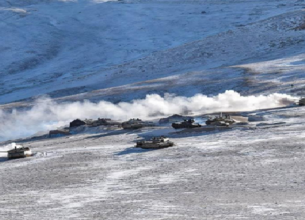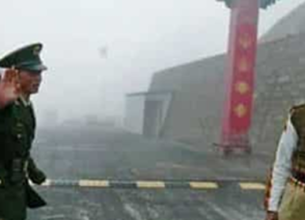India-China Clash: Why China has opened new front?
16, Dec 2022

Prelims level : International Relations
Mains level : GS-III Internal Security - Border Area Security Challenges
Why in News?
- There has been yet another transgression by Chinese troops across the Line of Actual Control (LAC) between India and China. That it culminated in violence, that it took place this time in the Eastern Sector of their boundary dispute, or that it should take place in the middle of winter should surprise no one.
- If there is one lesson that can be drawn from India’s experiences with Chinese transgressions over the last decade or so, it is that the Chinese seem to set the pace on the nature and timing of these transgressions.
Army’s statement about the clash:
- On December 9, 2022, People’s Liberation Army (PLA) troops contacted the LAC in the Tawang sector, which was contested by own troops in a firm and resolute manner.
- This face-off led to minor injuries to a few personnel from both sides,” “Both sides immediately disengaged from the area.”
Events of Chinese transgressions: Need to understand the nature and timing
- Depsang in Ladakh, 2013: Chinese troops came across the LAC, pitched tents and refused to move for several weeks until New Delhi threatened to cancel the planned visit of Premier Li Keqiang to India. This might have been a diplomatic victory for the Indian government but it also highlighted the inability of the Indian military to bring an end to the standoff or the unwillingness of the government to let the military take the lead in responding.
- Chumar in Ladakh, Sept, 2014 in the middle of the Xi Jinping’s first visit to India: Chinese intruded at Chumar, also in Ladakh, in the middle of Chinese President Xi Jinping’s first state visit to India. This was in keeping with a reasonably long tradition of Chinese transgressions during important visits but it was also notable for confronting Indian troops in an area where they enjoyed a degree of military advantage.
- Doklam in 2017: China provoked India with infrastructure development in a third country in Bhutan’s Doklam territory. This was a case of China trying to browbeat an Indian treaty ally.
- Transgression across multiple locations in 2020 and Galwan valley clash: The Chinese PLA took advantage of Covid-19 and a lack of Indian military alertness to transgress across multiple locations on the LAC in eastern Ladakh. On June 15, 2020 episode when 20 Indian soldiers were killed and several others were injured in violent clashes with the PLA troops in Ladakh’s Galwan Valley.
Why China has opened new front in Tawang?
- Status quo along the boundary are no longer going to be limited to the Western Sector: China has traditionally been active in areas close to Ladakh given the significance of the Xinjiang-Tibet region in its domestic narrative. However, with its sights on an ageing Dalai Lama, and the issue of his succession, Beijing will want to bring into focus its claims on Tawang, and the rest of Arunachal Pradesh.
- Huge investment in infrastructure in eastern sector: China has invested in infrastructure in the Eastern Sector over many years. This includes rail, road, and air connectivity, better telecommunications, as well as improved capacity to station and supply troops and artillery.
- Centrality of the boundary issue in the India-China relationship: External Affairs Minister S Jaishankar has repeatedly asserted that it is no longer possible to separate the boundary question from the overall relationship and that peace and tranquillity on the LAC is the key to restoring relations. However, China is likely to keep up the pressure on the ground along the LAC, even as they continue to suggest that the two countries look beyond the differences, much like Chinese Foreign Minister Wang Yi’s comments during his March 2022 visit when he claimed that the two sides need to “inject more positive energy” into the relationship.
India’s preparedness and learnings from the incident:
- Indian Army anticipated such kind of transgression in eastern sector: The Indian Army had for long anticipated that the PLA would activate the eastern sector of the LAC, and to that extent, it is evident that steps were taken to beef up military preparedness in the region.
- Light on what gaps to address: What the incident has effectively achieved though is the lighting up of one more section of the LAC at a time the issues in Ladakh have not yet been settled, from the point of view of India.
- China appears not want to disengage: After 16 rounds of talks, a disengagement has taken place in eastern Ladakh, but it has not restored the status quo that prevailed in April 2020. China, for its part, appears reluctant to hold any further rounds of talks on the leftover problems in Ladakh, including its play in Depsang and Demchok areas.
- China is only increasing the economic gap between itself and India: China has only increased the economic gap between itself and India and in the intervening years, not only built up more infrastructure in its border provinces but also tried to integrate these regions much more closely with neighbouring economies such as Pakistan and Nepal through grand projects such as the Belt and Road Initiative and pressuring Thimphu to open formal diplomatic ties with Beijing.
Way ahead:
- India’s relationship with China has been teetering from bad to worse over the last 32 months since the standoff in Ladakh began, and it seems unlikely to improve unless Beijing’s calculus vis a vis India and the region undergoes a drastic change.
- While Delhi’s G20 leadership may bring opportunities for engagement with Beijing, what is required first is a clear vision and a grand strategy to deal with the China challenge, instead of reacting to each crisis as it emerges.








